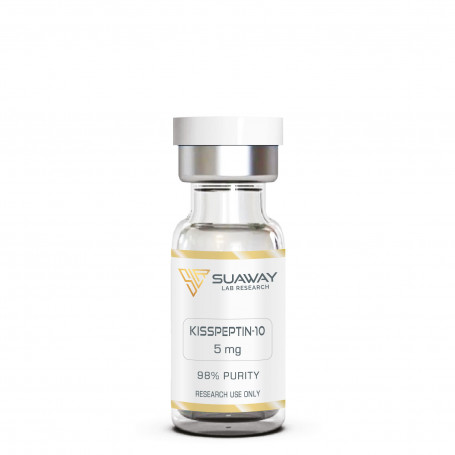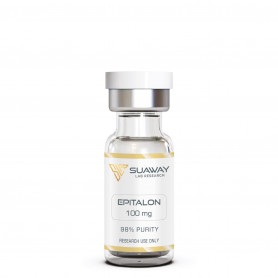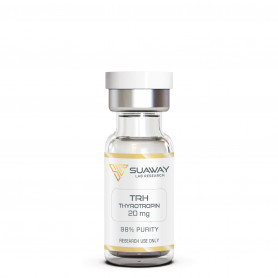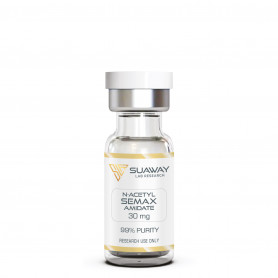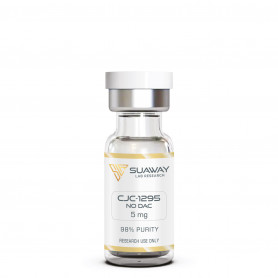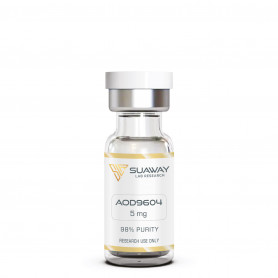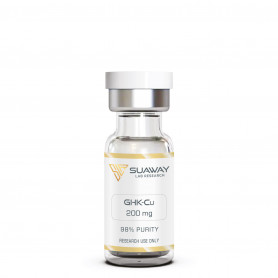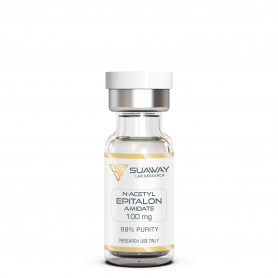KISSPEPTIN-10 - 5 mg
Kisspeptin is a naturally occurring protein in humans that plays important roles in hormone signaling during puberty and reproduction. Additionally, it is believed to affect renal function, angiogenesis, testosterone levels, and mood and behavior. The peptide, which is known to inhibit tumor development and metastasis, has also been discovered in the brain. The peptide is of greatest scientific interest for its ability to influence gonadotropin releasing hormone (GnRH). Research also suggests it may help to reverse some of the effects of aging.
Beschreibung
STRUCTURE
Sequence: YNWNSFGLRF (Modifications: Phe-10 = C-terminal amide)
Molecular Formula: C63H83N17O14
Molecular Weight: 1302.4 g/mol
CAS: 374675-21-5
Peptide purity: Greater than 98%
Other details: No TFA Salt, No Mannitol
Storage: Lyophilized peptide must be stored at -20°C and peptide solution at 4°C.
kisspeptin-10 has good oral and excellent subcutaneous bioavailability.
DESCRITPION
Kisspeptin is a peptide that regulates hormone secretion about human reproduction largely, but not entirely, in the brain. Understanding how kisspeptin affects sex-related behaviors including drive and motivation as well as testosterone levels is of significant interest.
It has long been known that kisspeptin may have an impact on the growth and spread of malignant cells. The peptide's activity in vascular development and operation may be related to its capacity to affect metastasis.
Kisspeptin may change the amounts of testosterone by influencing the levels of LH and FSH in the blood. But this modification seems to be sex-specific. Kisspeptin raises testosterone levels in males while having no appreciable effect on testosterone in women. Six males received an IV injection of a kisspeptin derivative in one research. After only 90 minutes, they demonstrated a considerable rise in plasma testosterone levels (almost 3-fold). Kisspeptin may aid to fine-tune the typical pulsatile release of sex hormones since a different kisspeptin analog has been discovered to change the pulse frequency of LH in males. Kisspeptin-10 treatment in healthy males showed a quick and dose-dependent rise in blood LH levels and a parallel rise in testosterone levels. This achievement seems to be accomplished by kisspeptin-10 boosting the pulsatile release of LH. If kisspeptin-10 is administered in high enough dosages, it may produce continuous LH release by causing fast pulsing that completely obscures individual pulses. This discovery opens up the possibility of using kisspeptin and its analogs in a range of conditions, including pregnancy, low testosterone levels, and more.
It has long been known that kisspeptin neurons are sensitive to a person's energy level. Both severe undernutrition and overnutrition may significantly reduce kisspeptin neurons' ability to stimulate the production of GnRH. In reality, a mechanism that seems to be mediated by kisspeptin may cause infertility in both men and women as a result of abrupt alterations in energy balance.
It follows that the sensitivity of kisspeptin synthesis and release to energy balance is well known. However, it is becoming more evident that kisspeptin may also control energy balance. This discovery was made after studying mice that have had the kisspeptin receptor (Kiss1r) genetically deleted. These mice had more adiposity and less energy consumption. It turns out that brown adipose tissue and adipose (fat) tissue both have the kisspeptin receptor.
It was established twenty years ago that kisspeptin may decrease melanoma (malignant skin cancer) spread by up to 95%. The peptide seems to have this effect by inhibiting the migration of cancer cells. Kisspeptin levels fluctuate (usually decrease) in several metastatic cancer types, including breast, bladder, GI, prostate, pancreatic, ovarian, skin, and thyroid cancers, indicating that the peptide is involved in the growth of the disease.
The incredible diversity of this peptide has increased interest in kisspeptin as a cancer therapy. Kisspeptin, according to Dr. Floriana Morgillo, might prevent metastases in several organs, significantly lessen disease burden, extend the life expectancy of cancer patients, and make it simpler for present therapies to induce remission.
Only in the early months of 2020, when an investigation connected levels of the peptides to exposure to sunshine, was an intriguing correlation between kisspeptin, melatonin, and cancer found. Mice exposed to light and darkness in the experiment had radically different amounts of melatonin and kisspeptin. Kisspeptin levels were high and melatonin levels were low in those who were exposed to sunshine. For those who were kept in the dark, the reverse was true. The mice received injections of melanoma cells to increase the experiment's usefulness. It finds out that the tumor growth rates and tumor volume were quite high in the daytime mice. Metastasis was not assessed in any way. Although the precise relationship between melatonin and kisspeptin in tumor suppression is yet unknown, it seems that one affects the other.
It seems that certain kisspeptin analogs play a crucial role in the brain regions in charge of memory consolidation. This shows that kisspeptin and its analogs contribute to neurons' capacity to store information, which makes these peptides potentially useful for reversing learning deficiencies caused by several hereditary and chronic illness conditions.
Reproduction and emotion are linked together in the same way that energy status and reproduction are. Researchers wondered how kisspeptin would affect mood and behavior given its function in both reproduction and energy regulation. They administered kisspeptin to 29 healthy heterosexual males in comparison to placebos to investigate this association. Kisspeptin recipients had increased limbic brain activity. In particular, the people showed greater desire, reward-seeking behavior, and general mood improvement. It would seem that kisspeptin contributes to the integration of sexual and emotional brain activity with the process of reproduction as a whole.
Although kisspeptin's precise function in the kidney is unknown, it seems that it may be related to the protein's bigger general function in regulating vascular development and damage response. Kisspeptin may have a significant role in certain vascular beds but not others, helping to regulate vasoconstriction and even cardiac output in some situations, according to research on cardiovascular illness in mice. Kisspeptin's effects on angiogenesis and vascular function seem to be connected to its effects on the renal and cardiovascular systems. This characteristic might also help to explain kisspeptin's ability to prevent tumor spread.
REFERENCES
t. lY ET AL., "KISS1 in metastatic cancer research and treatment: potential and paradoxes" [PubMed]
V. Ciaramella et al., "Antitumor efficacy of Kisspeptin in human malignant mesothelioma cells" [PMC]
Campbell J.L. Harter et al., "The role of kisspeptin neurons in reproduction and metabolism" [PubMed]
E. Gibula-Tarlowska et al., "Kissorphin improves spatial memory and cognitive flexibility impairment induced by ethanol treatment in the Barnes maze task in rats" [PubMed]
J.T. George et al., "Kisspeptin-10 is a potent stimulator of LH and increases pulse frequency in men" [PubMed]
E.J. Mead et al., "Kisspeptins: a multifunctional peptide system with a role in reproduction, cancer and the cardiovascular system" [PubMed]
A.N. Comnicos et al., "Kisspeptin modulates sexual and emotional brain processing in humans" [PubMed]
W.S. Dhillo et al., "Kisspeptin-54 Stimulates the Hypothalamic-Pituitary Gonadal Axis in Human Males" [The Journal of Clinical Endocrinology & Metabolism]
P. Pazarci et al., "The effects of daylight exposure on melatonin levels, Kiss1 expression, and melanoma formation in mice" [PubMed]
M. Bhattacharya et al., "Kisspeptin: beyond the brain" [PubMed]
DISCLAIMER
This product is intendend for lab research and development use only. These studies are performed outside of the body. This product is not medicines or drugs and has not been approved by the FDA or EMA to prevent, treat or cure any medical condition, ailment or disease. Bodily introduction of any kind into humans or animals is strictly forbidden by law. This product should only be handled by licensed, qualified professionals.
All product information provided on this website is for informational and educational purposes only.

